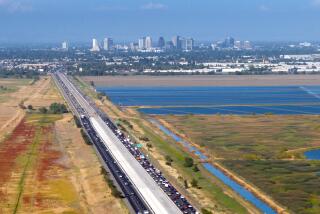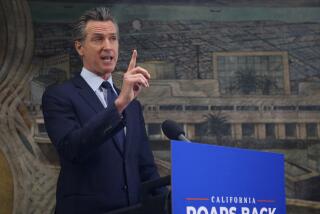Transportation Policy Overhaul Clears Senate
WASHINGTON — After resolving a bitter war between the states over federal highway funding, the Senate on Wednesday voted 91 to 7 to approve a five-year, $123-billion measure that would dramatically overhaul national transportation policy.
The legislation would give states unprecedented flexibility to spend federal funds on mass transit instead of highways. And through promoting the use of high-speed trains, “smart cars” and other new technology, the measure emphasizes cutting traffic congestion over starting massive road building projects.
The House is expected to consider its own transportation bill later this summer--one that will call for similar flexibility in spending but will total nearly $154 billion, far more than the Senate measure or President Bush’s $105-billion proposal.
Regardless of whatever figure ultimately becomes law, it will still face the annual appropriations process, which frequently results in lower actual spending.
The Senate’s vote Wednesday followed passage of a compromise amendment aimed primarily at giving billions of dollars in bonus money to California and other states that historically have paid more in federal gasoline taxes than they have gotten back in federal transportation aid.
California’s two senators, Democrat Alan Cranston and Republican John Seymour, both voted in favor of the bill.
How to divvy up the $8.2 billion in bonus money was resolved after several days of furious bargaining on the amendment offered by Sen. Robert C. Byrd (D-W.Va.), chairman of the Senate Appropriations Committee.
Originally, the bonus dollars were intended for only 33 states, but eventually 42 and the District of Columbia wound up with some in the frenzied scrambling. The amendment’s final version would leave California $959 million richer. But there was a question about whether the extra funds would end up being given to other programs in future budget battles.
Overall, the bill would earmark $17.8 billion for California.
The bonus fight overshadowed provisions in the bill that would make the first major changes in transportation policy in 35 years, changes spurred by the near-completion of the Interstate Highway System.
The bill, principally authored by Sen. Daniel Patrick Moynihan (D-N.Y.), proposes to spend about $18 billion more over five years than Bush’s proposal. An amendment added last week, endorsing Bush’s proposal for a new national highway system, appeared to temper an Administration veto threat.
But in a significant difference with the Administration, the Senate bill puts the federal share of highway and mass transit costs at 80%, with one exception: 75% for new road construction. That change was made in an effort to inhibit such construction.
In sharp contrast, Bush proposes that the federal share for building and repairing major highways remain at 90%. He also urges that the federal match for secondary roads and most mass transit programs be reduced to 60% from the current 80%.
Democratic leaders in the House are expected to unveil their own transportation proposals after Congress returns from its July 4 recess. Rep. Norman Y. Mineta (D-San Jose), chairman of the House subcommittee on surface transportation, said the House measure will call for spending $153.5 billion over five years beginning Oct. 1, financed in part with a nickel increase in the 14-cents-a-gallon federal gasoline tax. The Senate bill does not call for an increase in the gasoline tax.
The big fight in the Senate began over how to distribute $45 billion in the Surface Transportation Program.
Moynihan sought to preserve the old allocation formulas by basing a state’s funding level on an average of its receipts from the Highway Trust Fund over the past five years.
But his proposal sparked a revolt among 21 so-called donor states that stood to continue paying more into the trust fund than they took out. Those states are mostly in the South and Midwest but also include California, which paid $5.48 billion to the trust fund from 1987-90 but received only $5.07 billion in federal aid.
Republican Sen. John W. Warner of Virginia, a donor state, had planned to offer an amendment radically altering the 75-year-old funding formulas, which are based mainly on a state’s area, rural population and rural mail delivery mileage.
But he was upstaged by Byrd, who moved instead to award an $8.2-billion bonus to 33 states with relatively high state gasoline taxes and low per capita incomes.
Byrd’s plan covered all the donor states and enough others to provide the votes to carry the scheme. But states left out of a share began jockeying for bonus money, prompting Sen. Jesse Helms (R-N.C.) to say: “There isn’t enough room at the trough.”
Eventually, Byrd incorporated a change by Sen. Lloyd Bentsen (D-Tex.) that added nine more states to the bonus pool. The change increased a state’s guaranteed minimum return from the highway trust fund to 90% from the current 85%.
But the fighting did not end with adoption of the Byrd amendment Tuesday. Eight states still lacked a bonus, including those represented by Senate Majority Leader George J. Mitchell (D-Me.) and Minority Leader Bob Dole (R-Kan.). Dole pushed for a new bonus formula based on what a state spends on highways from all sources, not just gas taxes.
After long haggling, Dole and Byrd agreed on a non-binding measure urging that Senate and House conferees eventually consider both of their formulas in settling the dispute.
Several senators expressed concern that the $8.2-billion bonus might never be paid because by the time it is due to kick in fully, congressional budget rules will have changed, enabling other domestic and defense programs to grab the funds.
Carl B. Williams, assistant director of Caltrans, said he was concerned that California could not count on the full $17.8 billion the bill would provide the state.
“Is the Byrd (bonus) money real money or Monopoly paper?” Williams asked, amid lobbying rounds on the bill. “How well does steel and concrete compete with human services?” he said, referring to potential future funding battles in Congress.
Williams also raised questions about the $1 billion that California would receive under a new program in the bill to help cities such as Los Angeles reduce congestion to meet clean air standards.
“That money is sent to us on the basis of how bad our air is, so any improvement reduces the amount of money we receive,” he said. “Is that the best incentive to fix bad air?”
More to Read
Get the L.A. Times Politics newsletter
Deeply reported insights into legislation, politics and policy from Sacramento, Washington and beyond. In your inbox three times per week.
You may occasionally receive promotional content from the Los Angeles Times.









